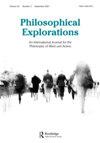What do my problems say about me?
IF 1.1
3区 哲学
0 PHILOSOPHY
引用次数: 0
Abstract
ABSTRACT ‘If I experience X, is it because of the illness, the medication, or is it ‘just me’?’ (Karp 2009) [Is it me or my Meds? Living with Antidepressants. Harvard University Press]. This issue is known as self-illness ambiguity (SIA) (Sadler 2007) ["The Psychiatric Significance of the Personal Self." Psychiatry: Interpersonal and Biological Processes 70 (2): 113–129]. In her paper Know Thyself: Bipolar Disorder and Self-concept, Carls-Diamante (2022) [“Know Thyself: Bipolar Disorder and Self-Concept.” Philosophical Explorations, 1–17] offers a taxonomy of different ways in which Bipolar Disorder can be related to one’s self and self-concept. In contrast to the essentialist model of mental disorders she seems to adopt, I propose a different outlook on SIA, following an enactive approach to psychiatric disorders as disorders of sense-making. One’s way of making sense of the world and/or oneself can become stuck in a rigid pattern that is stronger than oneself and at odds with how one would want to be. I argue that it is helpful to distinguish between the experiential SIA of specific experiences (Am I over/underreacting?) and the long term concerns of existential SIA (How to live my life in accordance with what matters to me despite/while having certain vulnerabilities?). I conclude that knowing oneself is not an intra-individual matter, nor primarily a matter of reflection: it is rather a relational and material practice of trying to live your life in accordance with what matters to you.我的问题说明了我的什么?
摘要“如果我经历了X,是因为疾病、药物,还是‘只有我’?”(卡普2009)[是我还是我的药?与抗抑郁药共存。哈佛大学出版社]。这个问题被称为自我疾病模糊(SIA)(Sadler 2007)[“个人自我的精神病学意义”。《精神病学:人际和生物过程》70(2):113-129]。Carls Diamante(2022)在她的论文《了解Thyself:双相情感障碍和自我概念》(Know Thyself:Bipolar Disorder and Self concept)中[《哲学探索》,1-17]提供了双相情感疾病与自我和自我概念相关的不同方式的分类法。与她似乎采用的精神障碍的本质主义模式相反,我对SIA提出了不同的看法,将精神障碍视为有意义的障碍。一个人理解世界和/或自己的方式可能会陷入一种僵化的模式,这种模式比自己更强大,与一个人想要成为的样子不一致。我认为,区分特定经历的经验SIA(我是否反应过度/反应不足?)和存在主义SIA的长期担忧(尽管存在某些脆弱性,但如何按照对我重要的事情生活?)是有帮助的。我的结论是,了解自己不是一个个体内部的问题,也不是一个主要的反思问题:它是一种关系和物质实践,试图按照对你来说重要的事情来生活。
本文章由计算机程序翻译,如有差异,请以英文原文为准。
求助全文
约1分钟内获得全文
求助全文

 求助内容:
求助内容: 应助结果提醒方式:
应助结果提醒方式:


